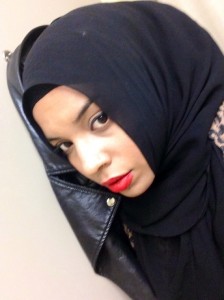I was ten-years-old. The air was sticky and heavy, the kind of heat that makes everything move in slow motion. My cousin, who is two years older than me, was lounging on the living room sofa watching Saturday morning cartoons, and wearing boxer briefs – the image of Spider-Man splayed purposefully across the crotch.
Granny brought him a cup of Ovaltine tea, which was always a bit too sweet. He glanced away from the television only long enough to take the cup from her hands with a mumbled thank you.
I remember that day, standing in the doorway of my room, watching my cousin in all of his entitlement and liberty. One leg on the coffee table, the other draped over the couch, stretching and contorting Spider-Man’s poor face. I watched the women in our house cater to him, speak softly to him, tell him how handsome he was, how much he looked like his father. They let him be a 12-year-old boy.
I didn’t have the vocabulary to describe how angry I was at him for this, or why. At the age of ten, my body had already begun to fill out. I was one of those girls who bypassed the training bra phase. I thought of the hushed ways in which my family talked to me about my body, the way buying bras in the women’s section was a secret, something my Aunties would talk about amongst themselves in concern and silent upheaval.
I remember thinking about these things while I watched him lounge carelessly that Saturday morning, and I remember the precise moment when I decided that it was unfair and that I had had enough.
My grandmother called out, telling me to take my morning shower and come help her fry plantain in the kitchen. I hated this job because of the popping oil, but when Granny told you to do something there was no room for protest.
I went back into my room, stripped down to my pink Sailor Moon panties and my uncomfortably adult bra, and grabbed my towel. Instead of wrapping it around me as was custom, I slung the towel over my shoulder and put on my flip flops. The bathroom was located just beyond the living room and kitchen. My ten-year old version of radical resistance was to walk (not run) to the bathroom, unveiled.
My cousin looked up as I passed the living room, unfazed by my partially uncovered body and newfound radical attitude. To him, I barely existed. No amount of prepubescent feminism was going to change that.
My Grandmother had stepped away from the stove to make sure I hadn’t disobeyed her and gone outside to climb the lime tree in the back, or skip rocks on the small river behind the house. As she stepped out of the kitchen to check, I walked right into her.
Do you know that look of horrified shock that you are unable to hide on your face, like when you see a spider, or watch someone at the circus swallow knives? That’s exactly how my Grandmother’s face changed that day, from determination to utterly disgusted shock.
“Oh God, gyal!” she screamed. “You ain’t ‘ave no shame!”
She grabbed me by my right arm with one hand, and wrapped the towel around me with the other. My cousin, hearing the commotion, arose from his royal throne. He stood long and lanky in the hall, asking, “What’d she do?”
Granny, too angry to answer, dragged me to the bathroom, put me in the tub, and scrubbed my skin so hard I thought it would tear off. She said nothing while she scrubbed, and I knew better than to complain.
But when she had finished rubbing lotion into my skin and putting clothes back on me, she said, “Baby, you is not a likkle girl anymo’, you must learn to cover yuh skin! You must ‘ave some shame, or else dey go’ call you nasty and wutless, an we cyan’ tek di scandal.”
I never forgot that day. Even as I reflect on it now, I remember my grandmother’s beautiful face, the fear in her expression. The anger I had understood, even the disgust, but not the fear.
I felt a tremendous sense of loss. Until then, I had always thought of myself as a little girl, a kid. Women were never supposed to do what I had done. I felt ashamed and disgusted for having exposed myself like that. I most certainly didn’t want to be a topic of kitchen gossip, the way other people’s daughters and granddaughters were.
By 11, I was wearing a C-cup, and the attention I was receiving was confusing. On the one hand, I was told that I was too young for certain things. On the other, I was told to be more mature, to act like an adult.
The first time a man approached me I was 11-years-old, riding my bike home from school. I was confused. I knew that adults approached adults like this; I had seen men making passes at my Mother and my Aunties before, and I had watched them wave these men off and ignore them. So that is what I did. I kept pedaling up the hill towards my house and he kept gaming me through the window of his car, until finally he was tired of my unresponsive attitude and said, “Little Girl, you don’t hear me talking to you?!”
Eventually he drove off and left me, heart smashing against my ribs, out of breath from pedaling so hard. I finally understood the fear on my Grandmother’s face that day in the bathroom.
We live in a world where young girls become adults overnight, where our girlhood is stripped away in a single conversation, a single encounter, a single trip to the bathroom, a single sleepover – and we are left to struggle through the transition, often alone. We are expected to know what the social cues of a woman are, to remember how to maneuver between girlhood and womanhood, and, sometimes, to exist as both simultaneously.
Out of fear, we are shamed for our bodies by those who equate the development of breasts and pubic hair as the end of girlhood. If we are unable to navigate the tumultuous terrain of girl-into-woman, they dangle the potential of social ostracization over our heads. Our bodies are canvases they project their fears onto. They try to scare us into submission instead of creating spaces for thought and dialogue, instead of exchanging honest survival guides.
Since the age of ten, I’ve struggled with this idea of when to be a woman and when to be a girl. Now, at the age of 23, I’m reflecting on and trying to deconstruct all the times I was lost in the limbo between girlhood and womanhood.
I often wonder: if I had made it to the bathroom that day without colliding with my Grandmother, what might my next act of resistance have been? And how long after that would I have had an encounter with someone similar to my Grandmother, someone else eager for me to grow up careful so that they could be comfortable and without fear?
—
Read more from Key on our site, here!
Key Ballah is a Toronto-based writer and Hip Hop enthusiast. She is the author of the poetry collection, ‘Preparing My Daughter For Rain‘, she melts faith, love and her experiences of being a woman of colour navigating the western world in her writing. She believes in empowering the brown girl to reclaim her selves and her body, by connecting and healing collectively, over borders, oceans and time zones, through story telling and poetry. She is currently working on a new project due out this fall.













